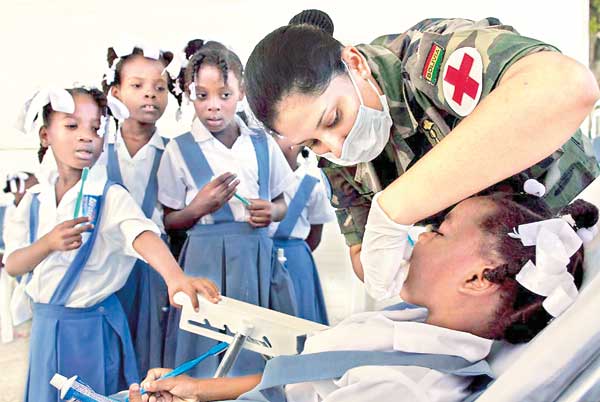Reply To:
Name - Reply Comment
By Vinod Thomas
Economic growth is front-page news everywhere. But experience tells us that the link between income and human development is far from assured. Worldwide, countries with similar per capita incomes have had quite different achievements in basic education or basic health. In the 1990s, the Philippines and Sri Lanka had similar per capita incomes, yet the poverty rate in the Philippines was much higher then and has remained so.

So growth is necessary but not sufficient for advancing human development. Despite delivering strong growth, many countries in Asia and the Pacific have been unable to reach many of the targets for human development set in the Millennium Development Goals (MDGs), which were announced by the United Nations in 2001.
This raises a crucial question as the 2015 expiry of the MDGs approaches: How can human development match or exceed the expectations generated by rising per capita income? A good place to start is with greater attention to education and health.
As the fastest-growing region in the world, Asia and the Pacific more than tripled per capita incomes during the past two decades. This helped income poverty rates fall from 55 percent in the early 1990s to less than 25 percent by the late 2000s. Yet, the region has not achieved the MDGs of universal primary education. Progress on child and maternal health has been weak. And targets for carbon emissions and forest cover have suffered serious setbacks.
In the Philippines, the high 6.6-percent growth in gross domestic product (GDP) in 2012, achieved despite the global downturn, has given the country new confidence. The strong figure helped motivate the country’s first investment-grade credit rating from international rating agencies and fueled a surging stock market. The country also has great strengths in the social arena—for example, a 95-percent literacy rate. And the participation of women in wage employment, in both chambers of Congress and in senior management stands well above levels in Indonesia or Sri Lanka.
That said, economic growth in the Philippines has generally lagged behind its developing Asia neighbors during the past two decades. Economic gains have also not been widely shared, leaving unemployment high. And the poverty rate (by national estimates) has not declined in the past decade.
The Philippines is also beginning to lag in areas where it used to be a leader. Over the past two decades, for example, net primary school enrollment is estimated to have declined, making it the lowest among its neighbors. The country also has among the highest adolescent birth rates (at 53 per 1,000 women) and a large unmet need for family planning services.
The good news is that in the Philippines and elsewhere, investments can improve education and health. It pays to put a whole nation—not just the government—to work on human development.
First, governments can spend more and more efficiently on human development. Sri Lanka and the Philippines both spend roughly 1.5 percent of GDP on health, yet Sri Lanka has better results on maternal and under-five mortality. Observers attribute these outcomes in part to intensive and efficient use of personnel and facilities in a dense network of health facilities.
In the Philippines, there have been increases in budget spending on social sectors in recent years. The need for better targeting of the poor and preventing leakage, in which spending goes to unintended and better-off recipients, has long been identified as a challenge for the Philippines’ poverty programmes. So the early results of the conditional cash transfer programme (with an allocation of P44 billion in 2013, up from P39 billion in 2012) are highly encouraging.
Second, while households spend a great deal on education and health, investments from the business community could play a much bigger role. Efforts by the Philippine business community need to be strengthened, including through public-private partnerships, in classroom building, provision of books and computer laboratories, education service contracting, scholarship grants, early childhood education and teacher training. Collaboration between industry and academe in research and development could also be improved.
Third, the Philippines should tap and apply the resources of civil society in education and health. Decentralized administration, participation by a broader spectrum of society and third-party monitoring are areas of strength for the Philippines. The ‘Textbook Count’ is a good example: The programme mobilizes citizens to monitor textbook procurement from bidding, through production, to delivery, significantly reducing textbook costs, losses and delivery times.A rising tide can lift all boats—imagery that underscores the potential value of economic growth for improving human development for all. But in the Philippines and elsewhere, more and better spending on education and health—by the government, the business community and civil society—is urgently needed.
(Vinod Thomas is Director General of Independent Evaluation at the Asian Development Bank)